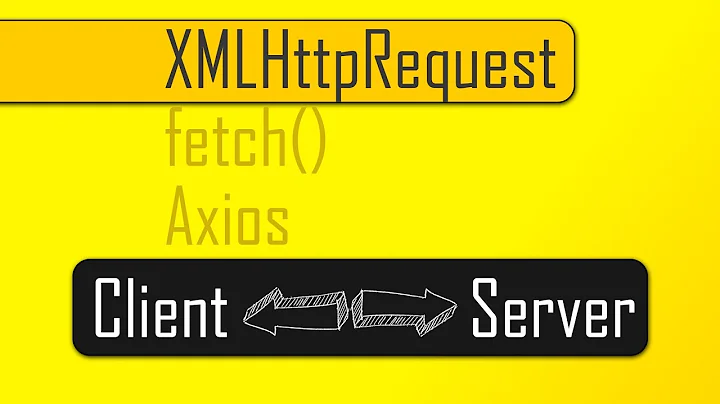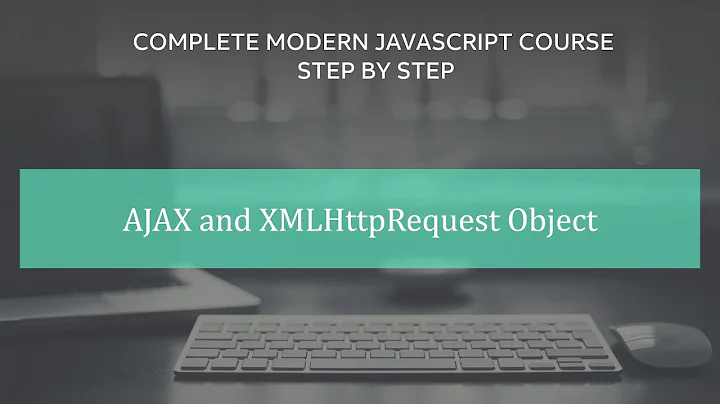Setting XMLHttpRequest.responseType forbidden all of a sudden?
Solution 1
This is correct behaviour, as defined in the Specification of XMLHttpRequest:
When set: throws an
"InvalidAccessError"exception if the synchronous flag is set and there is an associated XMLHttpRequest document.
The responseType property cannot be set when the XMLHttpRequest is not async, that is, synchronous. Setting the third parameter of open to false causes the request to be synchronous.
Solution 2
Workaround
For the casual reader, if you still need the synchronous behavior, you can download your content as string and then convert it to byte data
NOTA:
This workaround assumes the original request.response is an ASCII text.
If this assumption doesn't fit your specific use case please see jBinary.
I convert it to an ArrayBuffer.
var request = new XMLHttpRequest();
request.open('GET', url, false);
request.send(null);
var data;
if (request.status === 200) {
data = stringToArrayBuffer(request.response);
} else {
alert('Something bad happen!\n(' + request.status + ') ' + request.statusText);
}
// ...
function stringToArrayBuffer(str) {
var buf = new ArrayBuffer(str.length);
var bufView = new Uint8Array(buf);
for (var i=0, strLen=str.length; i<strLen; i++) {
bufView[i] = str.charCodeAt(i);
}
return buf;
}
More reading
- jBinary: High-level API for working with binary data in Javascript.
- Sending and Receiving Binary Data: Binary data handling with vanilla Javascript. (Source: Mozilla Developer Network)
References
- Converting between strings and ArrayBuffers
- Renato Mangini's original function str2ab
- Easier ArrayBuffer <-> String conversion with the Encoding API (Jeff Posnik)
Solution 3
As it's not possible to set responseType = 'arraybuffer' in sync mode, receiving string and converting to bytes is a solution, but as Stephan said, your data should be an ascii text. You will receive wrong value (253) instead of all bytes above 127.
But setting mime-type and charset to x-user-defined might be a solution:
Here server send 10 bytes from 125 to 134:
request = new XMLHttpRequest();
request.overrideMimeType('text/plain; charset=x-user-defined');
request.open('GET', url, false);
request.send();
Uint8Array.from(request.response, c => c.charCodeAt(0));
> Uint8Array(10) [125, 126, 127, 128, 129, 130, 131, 132, 133, 134]
without setting mime-type it's like this:
request = new XMLHttpRequest();
request.open('GET', url, false);
request.send();
Uint8Array.from(request.response, c => c.charCodeAt(0));
> Uint8Array(10) [125, 126, 127, 253, 253, 253, 253, 253, 253, 253]
Related videos on Youtube
Markus
Updated on September 17, 2020Comments
-
Markus over 3 years
I've been using synchronous XMLHttpRequest with responseType set to "arraybuffer" for quite a while to load a binary file and wait until it is loaded. Today, I got this error: "Die Verwendung des responseType-Attributes von XMLHttpRequest wird im synchronen Modus im window-Kontekt nicht mehr unterstützt." which roughly translates to "Usage of responseType for XMLHttpRequest in synchronous mode in window-context(?) no longer supported."
Does anyone know how to fix this? I realy don't want to use an asynchronous request for something like this.
var xhr = new XMLHttpRequest(); xhr.open('GET', url, false); xhr.responseType = 'arraybuffer';Works fine in chrome.
-
Janus Troelsen about 11 yearsYou can do binary synchronous XHR's in Web Workers...
-
-
Markus about 12 yearsSounds weird to me that something like that is supposed to throw an exception. But thanks for pointing me to the specification.
-
Boris Zbarsky about 12 years@Markus The point is that you shouldn't be writing new code that uses sync XHR. Removing it altogether would break existing sites, but browsers and the spec are trying to restrict its use in new code so that new code actually does the right thing and uses async XHR.
-
 Tamas Hegedus about 8 yearsIs there a way to retrieve the original binary (non-ascii) binary data exactly?
Tamas Hegedus about 8 yearsIs there a way to retrieve the original binary (non-ascii) binary data exactly? -
Stephan about 8 years@TamasHegedus To answer your question, I have updated my post with a More reading section.
-
 Tamas Hegedus about 8 yearsI am suspicious about the binary-text-binary conversion not yielding the original bytes
Tamas Hegedus about 8 yearsI am suspicious about the binary-text-binary conversion not yielding the original bytes -
Stephan almost 7 years@TamasHegedus The workaround presented here works only with the assumption the original bytes are encoded in ASCII.



![Fix CORS Error [SOLVED] | React Tutorial](https://i.ytimg.com/vi/hxyp_LkKDdk/hq720.jpg?sqp=-oaymwEcCNAFEJQDSFXyq4qpAw4IARUAAIhCGAFwAcABBg==&rs=AOn4CLDs0NMhm3WR0Mqp4qKMm_85b3Ee_A)

![CORS Error & Solutions In A Nutshell [Cross Origin Resource Sharing]](https://i.ytimg.com/vi/gPzMRoPDrFk/hq720.jpg?sqp=-oaymwEcCNAFEJQDSFXyq4qpAw4IARUAAIhCGAFwAcABBg==&rs=AOn4CLCL9ZbwLoTEYnPYQFHRmL1ZdqSvVg)


